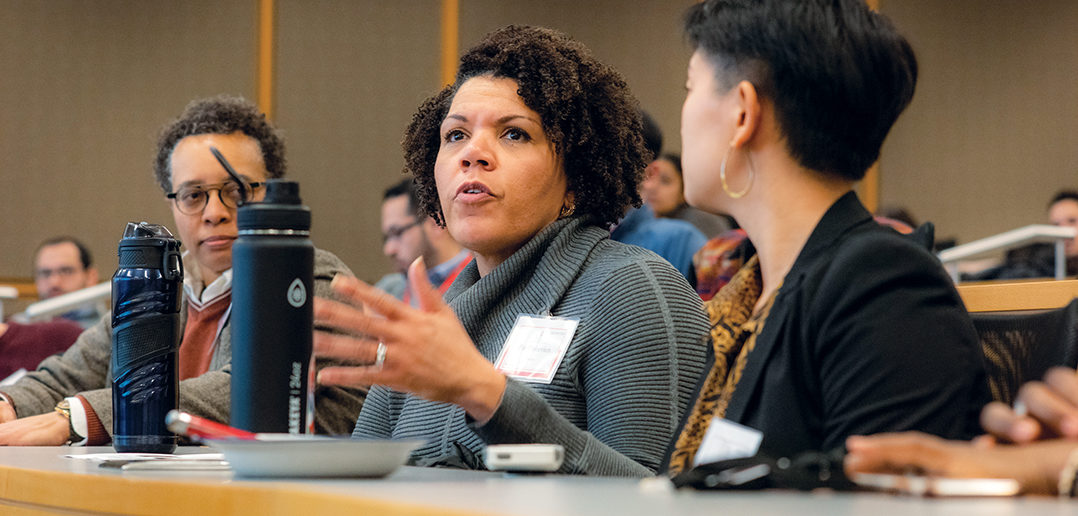A new program spreads the responsibility—and the love—of mentorship.
In medicine, as in many fields, mentorship is often critical to success. Finding someone with both similar interests and a similar identity, however, can be difficult for people who identify as underrepresented in medicine (UIM).
Compared to the numbers of medical residents and students, “there are very few faculty members who are underrepresented in medicine,” says Patricia Poitevien ’94 MD’98, MSc, director of Brown’s Pediatric Residency Program. For those faculty, trying to support all of the trainees and students seeking mentors “can be very, very overwhelming,” she says.
Poitevien joined the Medical School in 2018 as an assistant dean for diversity, and with her colleagues in the Office of Diversity and Multicultural Affairs—Associate Dean Joseph Diaz MD’96 RES’99 F’01 MPH’09 and Assistant Dean Tracey Guthrie RES’99, MD—worked to find a way to support UIM mentors at Brown so they in turn could better support mentees.
Their solution, which debuted in the fall, is MEDSTEP (Mentoring and Educating Diverse Students and Trainees to Excel as Physicians), a tiered mentorship program. “The idea is to leverage what is often seen as a disadvantage in academic medicine,” Poitevien says, by spreading the responsibility of mentorship among residents and fellows as well as faculty, thus creating a structure for both peer mentorship and vertical mentorship.
More than 150 people who identify as UIM have joined MEDSTEP. They’re grouped into “families,” loosely based on specialty, with up to 15 members, including two or three faculty “parents.” They meet informally, over dinner, twice each semester. Students say that family structure makes the faculty seem more approachable.
“I see Pat as a mentor and a doctor and someone who can give me advice about life in general,” Douglas Villalta ’18 MD’22 says of Poitevien, his family parent. He’s interested in pediatrics, but knowing the commitment MEDSTEP parents have made to the program, he says, “if I want to learn about another specialty I’d feel comfortable reaching out to” other families’ parents.
All MEDSTEP members gather each semester for “family reunions.” These are slightly more formal, with a speaker, dinner, and a social hour. Simply reviewing the physician roster for January’s reunion, which included many Hispanic last names, inspired Villalta. “It’s nice to see other people who are similar to your background who made it … through these exams and college and medical school,” he says.
Skenda Jean-Charles ’18 MD’22 anticipates her MEDSTEP connections will be especially helpful during third-year clerkships. “It’s such a pivotal year,” she says. “Having people to guide you through that and beyond … is very invaluable.” Getting the chance to know residents is similarly helpful, she adds, “because they recently went through med school, they understand what we’re dealing with now, they can give a clear picture of what residency is like.”
MEDSTEP isn’t just for students’ benefit. “It also provides meaningful connection for the faculty members,” who enjoy meeting their peers in other departments, Poitevien says. She adds that it’s “gratifying” to mentor residents and fellows to become mentors themselves. Some students and trainees think “this kind of work is a burden to the faculty members,” she says. “I want [them]to know that this is actually a huge privilege for us.”
If you’re interested in joining MEDSTEP, email rosedelma_seraphin@brown.edu.




